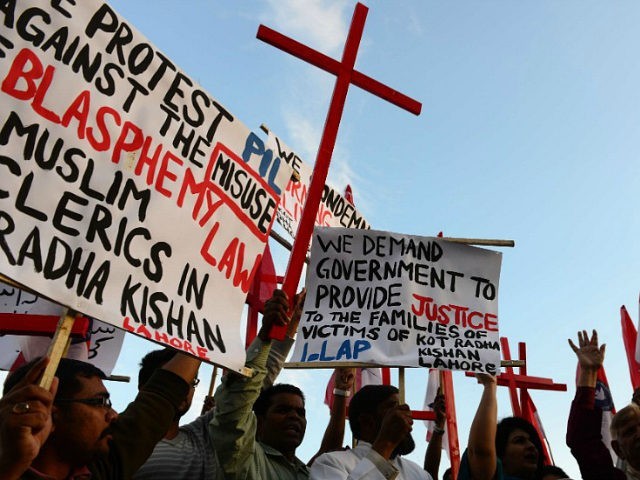Court cases involving the controversial anti-blasphemy law primarily used against Christian minority group members accused of insulting Islam seldom result in a fair trial in predominantly Muslim Pakistan, often leading to a harsh verdict of life in prison or death, reports Voice of America (VOA).
“Despite criticism, Pakistan’s government has been advocating strict enforcement of blasphemy laws,” points out the news outlet. “In April the government used newspaper advertising and text messages on mobile phones to warn millions of Pakistanis not to post, share or upload ‘blasphemous’ material online. Anyone encountering such material was asked to report it to the authorities.”
Citing Mehdi Hassan, a prominent Pakistani human-rights activist, VOA notes that a fair trial is hard to come by in blasphemy-linked cases, which can involve anything seen as an explicit insult to Allah, Islam, or religious leaders.
“The emotive nature of blasphemy makes it difficult to get a fair trial in cases involving religious beliefs,” VOA learned from Hassan.
“In Pakistan, religious might is very influential, and that thinking has an impact on police and other departments in such cases,” the activist told VOA.
Several analysts, including the British Pakistani Christian Association (BPCA), which tracks cases of Christian persecution in Pakistan, have determined that the Islamic country’s blasphemy laws are used to target religious minorities, primarily Christians.
Echoing VOA, the BPCA group noted late last year that, “in Pakistan, law courts are known for their manipulation of laws which are used as a tool discriminate minorities.”
The VOA report comes less than a week after a Pakistani court sentenced Nadeem James, a Christian, to death on charges of blasphemy.
An alleged friend, identified as a Muslim, accused James of sending him a poem via WhatsApp Messenger that insulted Islam, a claim that proved to be sufficient enough to fuel the court’s capital punishment decision on September 15.
James’s case is a testament to the hostility towards the Christian minority community that continues to brew in Pakistan.
Various Christians, including some as young as eight years old, have been accused of committing blasphemy in Pakistan, where an estimated 100 people are reportedly detained on such charges every year.
VOA reports:
For those accused of blasphemy – which can include anything seen as a deliberate insult to God, Islam or religious leaders – such an offense is literally a life-and-death matter. The relevant section of Pakistan’s penal code recommends either life imprisonment or death for any convicted blasphemer.
Pakistan has yet to execute anyone convicted of blasphemy.
Nevertheless, Human Rights Watch (HRW) has reported that “at least 19 people remained on death row [in 2016] after being convicted under Pakistan’s draconian blasphemy law and hundreds awaited trial.”
Moreover, many Islamic extremists have taken their version of justice into their own hands in Pakistan where even unproven claims can stir beatings and “mob violence.”
“Past blasphemy cases have stirred public anger that spiraled into mob violence and killings,” acknowledges VOA.
A Pakistani prosecutor indicated that it does not take much to convict a member of a minority group accused of blasphemy against the Islamic country’s dominant religion, suggesting that the flimsiest of evidence could potentially evolve into enough incriminating material to render a guilty verdict.
“The accused said … he never sent any blasphemous message through his cellphone,” Rana Naveed Anjum, a prosecution lawyer told VOA, referring to James’s case. “But once something has been alleged against you and there is enough evidence on record corroborating that assertion, then it is hard to deny or overlook such material.”
James’s defense attorney, Anjum Wakeel, argued that his client had been “framed” by his so-called friend, an Islam adherent.
“My client will appeal the sentence in the high court as he has been framed by his friend, who was annoyed over James’ affair with a Muslim girl,” declared Wakeel, according to the Agence France-Presse (AFP) news agency.
Echoing human rights groups, VOA points out that blasphemy accusations are subject to abuse, often used to settle personal disputes or vendettas.

COMMENTS
Please let us know if you're having issues with commenting.